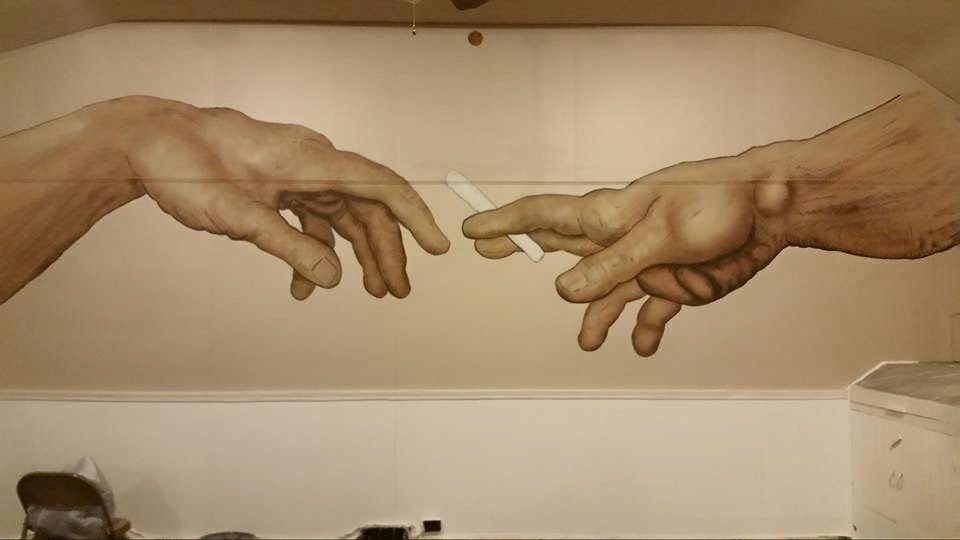by Abdul-Hakim Shabazz
July 1, 2025
Ten years ago today, something wild happened in Indiana. And no, I’m not talking about the Statehouse Wi-Fi finally working.
I’m talking about the birth of the First Church of Cannabis—an idea so crazy, so thoroughly Hoosier, that naturally… it came from me.
The year was 2015. I was sitting at the bar at Nicky Blaine’s, scotch in one hand, a cigar smoldering in the other, reviewing Indiana’s freshly minted Religious Freedom Restoration Act—RFRA, for those of you just joining the legislative chaos. Supposedly designed to protect religious liberty, the bill was really a reaction to the courts legalizing same-sex marriage, which—fun fact—is also celebrating its 10th anniversary this year. (Happy Anniversary, equality. More on that in a second.)
As I scrolled through the final version of RFRA, I noticed something odd. The original language had included a provision saying RFRA couldn’t be used as a defense in criminal cases. But in the final version? Poof—gone. Lawmakers, in their political haste, had snipped it.
I blinked. Took another sip of scotch. Looked at the cigar like it might be whispering legal theory. Then I had a moment of clarity—what you might call a scotch-fueled epiphany.
“No… that can’t be right,” I muttered to myself. “I think Indiana just accidentally legalized marijuana for religious purposes.”
Naturally, I did what any responsible citizen would do: I emailed Bill Levin—local mischief-maker, musician, political candidate, and agent of creative chaos. Subject line: Good News. Body: “Indiana may have just legalized cannabis… if you start a religion.”
You see, under RFRA, the government isn’t allowed to substantially burden your sincerely held religious beliefs—unless it has a compelling interest and uses the least restrictive means to do so. Without the criminal exemption, someone could plausibly argue that smoking marijuana was part of their religious practice. Cue the theological reefer madness.
To his eternal credit (or blame), Bill didn’t just nod politely and go back to playing guitar. He ran with it.
Within weeks, he launched the First Church of Cannabis, complete with its own doctrine (the Deity Dozen), a congregation, and the most obvious $4.20 monthly tithe in human history. He held the first service on July 1, 2015—the exact day RFRA took effect. There was music, meditation, and love… but no actual marijuana. Even Bill knew better than to light up with IMPD parked outside.
Now here’s your quick law lesson.
To challenge a law in court, you need standing—a real injury or a credible threat of one. You can’t just file a lawsuit because you think a law is dumb (which, to be fair, this one kind of was). Originally, Bill and law enforcement had floated the idea of staging it: he’d light up, get arrested, and then sue. But that’s called manufactured standing, and courts tend to treat it like a fake ID—interesting in theory, but legally useless.
So instead, Bill took a smarter path. He publicly announced his intent to light up during the inaugural service, and IMPD and the Marion County Prosecutor’s Office swiftly made it known that doing so would earn him a trip to the lockup. That threat of arrest? That was enough. The court found it credible and imminent, and just like that—Bill had standing.
Little risk, high reward. And if you know Bill Levin, you know that sounds about right. The man is just one lab accident away from gaining superpowers and using them exclusively to prank the General Assembly.
Bill sued the state, arguing RFRA protected his religious right to toke in peace. The courts disagreed. In 2018, a judge ruled that Indiana’s interest in enforcing drug laws outweighed his religious freedom claim. The appeal went up in smoke.
But culturally? The Church won.
A decade later, the First Church of Cannabis still meets weekly. Still preaches peace, love, and enlightenment by way of leafy greens. Still reminds lawmakers what happens when you write a law without understanding it.
And while Indiana has kept cannabis illegal, the landscape has changed. We are now completely surrounded by states where marijuana is legal in some form: Illinois, Michigan, Ohio, Kentucky, Missouri. You can get stoned on all sides like you’re living in the world’s most mellow siege. And with high-potency CBD and Delta-8 sold openly across Indiana, let’s face it: prohibition is basically performative at this point.
The First Church of Cannabis wasn’t really about getting high. It was about getting real—about exposing legislative hypocrisy and showing what happens when the law’s unintended consequences get passed around like a joint at a Phish concert.
RFRA was pitched as a shield for conservative values. It accidentally became a platform for progressive protest. That’s the thing about laws: once they’re out in the wild, they don’t always behave the way their authors intended.
So today, on this sacred tenth anniversary, let’s light a candle—or whatever’s legal—for the church that dared to ask, “Why not us?”
To Bill Levin, for turning a loophole into a movement—bless you, my brother in burlap.
To the Indiana General Assembly—thanks for giving us the legal equivalent of a Cheech & Chong sketch.
And to myself—next time I have a scotch-fueled legal epiphany at Nicky Blaine’s, cigar in hand, I’ll just keep it to myself.
Probably.
Abdul-Hakim Shabazz is the editor and publisher of Indy Politics. He’s also an attorney licensed in Illinois (where marijuana is legal) and Indiana (where it still isn’t).
(Except for the headline, this story has not been edited by PostX News and is published from a syndicated feed.)

